英语八下句型
初中英语八年级下册重点句型短语全

新人教版八年级英语短语全Unit 1 What’s the matter?1. have a fever 发烧2. have a cough 咳嗽3. have a toothache 牙疼4. talk too much 说得太多5. drink enough water 喝足够的水6. have a cold 受凉;感冒7. have a stomachache 胃疼8. have a sore back 背疼9. have a sore throat 喉咙痛10. lie down and rest 躺下来休息11. hot tea with honey 加蜂蜜的热茶12. see a dentist 看牙医13. get an X-ray 拍X 光片14. take one’ s temperature 量体温15. put some medicine on sth. 在……上面敷药16. feel very hot 感到很热17. sound like 听起来像18. all weekend 整个周末19. in the same way 以同样的方式20. go to a doctor 看医生21. go along 沿着……走22. on the side of the road 在马路边23. shout for help 大声呼救24. without thinking twice 没有多想25. get off 下车26. have a heart problem 有心脏病27. to one’ s surprise 使....... 惊讶的28. thanks to 多亏了;由于29. in time 及时30. save a life 挽救生命31. get into trouble 造成麻烦32. right away 立刻;马上33. because of 由于34. get out of 离开;从……出萍35. hurt oneself 受伤36. put a bandage on sth. 用绷带包扎37. fall down 摔倒38. feel sick 感到恶心39. have a nosebleed 流鼻血40. cut his knee 割伤他的膝盖41. put her head back 把她的头向后仰42. have problems breathing 呼吸困难43. mountain climbing 登山运动44. be used to doing sth. 习惯做某事45. run out (of) 用完;用尽46. so that 以便47. so. . . that 如此… …以至于…48. be in control of 掌管;管理49. in a difficult situation 在闲境中50. keep on doing sth. 继续或坚持做某事51. make a decision 做出决定52. take risks 冒险53. give up 放弃二、重点句型1. What’ s the matter?What’ s the matter with you?= What’s the trouble with you?= What’ s wrong with you?2. 你怎么了?What should she do?她该怎么办呢?Should I take my temperature?我应该量一下体温吗?主语+ should/shouldn’t + 动词原形. ..①You should lie down and rest.你应该躺下休息一会儿。
英语八年级下_第一单元语法

Unit 1 Will people have robots?I.重点词组及句型:1. There will be sth.= There is /are going to be sth. 将有……2. be free 空闲的,免费的3. on computer 在电脑上4. live to be + 岁数活到……5. fewer people 更少的人(fewer修饰名词复数);less free time 更少的空闲时间(less修饰不可数名词);(many /much) more +可数名词复数/不可数名词更多的……6. be crowded 拥挤的7. five years ago 五年前;in five years 五年后8. fly to the moon 飞向月球9. sb. will be +职业某人将成为……10. fall in love with sth./sb.爱上某人或某物11. live in an apartment with sb. 和某人住在同一个公寓里12. live alone 独自生活13. keep a pet parrot 养一只宠物鹦鹉14. go skating去滑冰15. like doing sth.喜欢做某事16. wear a suit\uniform 穿套装\制服17. be able to有能力做某事18. on vacation 在假期19. one day 将来\过去的某一天20. What will the weather be like tomorrow?=How will the weather be tomorrow?明天天气会怎么样?21. for fun 为了好玩22. make sentences with the words 用词造句23. come true(梦想等)实现;成为现实24. in sb's home 在某人家里25. be used by被……使用26. science fiction movies 科幻片27. in the future 将来28. be like humans 像人类29. help with sth. 帮助做……help do 帮助做……30. hundreds of 几百31. the same...as... 和……一样32. make ... do 让\使得……做33. It will be + adj. + to do sth. 做某事将会……34. try to do 努力\尽力做某事35. look like 看起来像36. get bored 变得厌烦37. many different shapes 许多不同形状38. electric toothbrush 电动牙刷1II.重点句型:1. People will have robots in their homes. 在家庭中人们会有机器人的。
八年级下册英语重点句子归纳
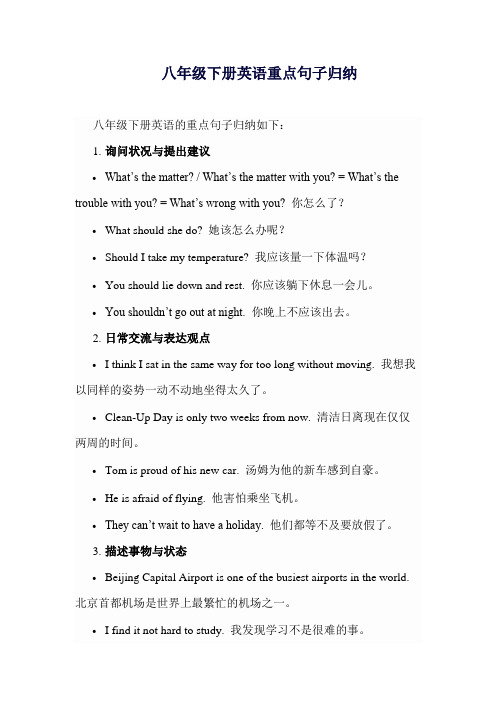
八年级下册英语重点句子归纳八年级下册英语的重点句子归纳如下:1.询问状况与提出建议•What’s the matter? / What’s the matter with you? = What’s the trouble with you? = What’s wrong with you? 你怎么了?•What should she do? 她该怎么办呢?•Should I take my temperature? 我应该量一下体温吗?•You should lie down and rest. 你应该躺下休息一会儿。
•You shouldn’t go out at night. 你晚上不应该出去。
2.日常交流与表达观点•I think I sat in the same way for too long without moving. 我想我以同样的姿势一动不动地坐得太久了。
•Clean-Up Day is only two weeks from now. 清洁日离现在仅仅两周的时间。
•Tom is proud of his new car. 汤姆为他的新车感到自豪。
•He is afraid of flying. 他害怕乘坐飞机。
•They can’t wait to have a holiday. 他们都等不及要放假了。
3.描述事物与状态•Beijing Capital Airport is one of the busiest airports in the world. 北京首都机场是世界上最繁忙的机场之一。
•I find it not hard to study. 我发现学习不是很难的事。
•Mum asks me to go home early after school. 妈妈叫我放学后早点回家。
4.其他常用句型与短语•get married 结婚•since then 从那时起•over the years 多年以来•in some ways 在某种程度上•from time to time 有时•feel lonely 感到孤独•share sth with sb 和某人分享某事•take a bus 坐公交车•go to school 去上学•keep in touch with ... 与……保持联系请注意,这些只是八年级下册英语中的一部分重点句子,实际的教材内容可能还包含更多的重要知识点和句型。
八年级下册英语所有语法全汇总
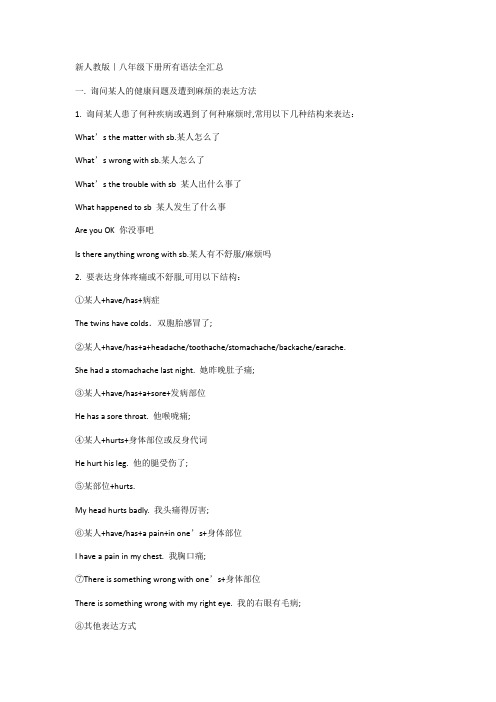
新人教版|八年级下册所有语法全汇总一. 询问某人的健康问题及遭到麻烦的表达方法1. 询问某人患了何种疾病或遇到了何种麻烦时,常用以下几种结构来表达:What’s the matter with sb.某人怎么了What’s wrong with sb.某人怎么了What’s the trouble with sb 某人出什么事了What happened to sb 某人发生了什么事Are you OK 你没事吧Is there anything wrong with sb.某人有不舒服/麻烦吗2. 要表达身体疼痛或不舒服,可用以下结构:①某人+have/has+病症The twins have colds.双胞胎感冒了;②某人+have/has+a+headache/toothache/stomachache/backache/earache. She had a stomachache last night. 她昨晚肚子痛;③某人+have/has+a+sore+发病部位He has a sore throat. 他喉咙痛;④某人+hurts+身体部位或反身代词He hurt his leg. 他的腿受伤了;⑤某部位+hurts.My head hurts badly. 我头痛得厉害;⑥某人+have/has+a pain+in one’s+身体部位I have a pain in my chest. 我胸口痛;⑦There is something wrong with one’s+身体部位There is something wrong with my right eye. 我的右眼有毛病;⑧其他表达方式She has a heart trouble. 她有心脏病;He got hit on the head. 他头部受到了撞击;She cut her finger. 她割破手指了;二. 情态动词should的用法1. should为情态动词,意为“应该;应当”,否定式为shouldn’t,其后接动词原形,无人称和数的变化;常用来表示征询意见、建议、劝告、要求或义务等;You should drink more water. 你应该多喝水;He should put his head back. 他应该把头后仰;We should try our best to help him. 我们应当尽力去帮助他; You shouldn‘t watch TV. 你不应该看电视;2. should用于主语为第一人称的疑问句,表示征询意见;Should I put some medicine on it 我应当给它敷上药吗Should we tell her about it 我们应该告诉她这件事吗3. 在英语中,表示建议的说法有很多,而且都是中考考查的重点;主要结构有:①Would you like to do sth你想要/愿意做某事吗Would you like to play basketball with me 你想要和我一起打篮球吗②Shall I/we do sth 我/我们做某事好吗Shall we go to the zoo tomorrow 明天我们去动物园,好吗③Why not do sth 为什么不......呢Why not join us为什么不加入到我们当中来呢④How/What about doing sth 做某事怎么样How about going swimming 去游泳怎么样⑤Let’s do sth. 让我们做......吧;Let’s go home. 咱们回家吧;⑥You’d better not do sth 你最好不要做某事;You’d better not go there alone. 你最好不要一个人去那儿;三. 反身代词英语中共有八个反身代词,在使用时应注意和它所指的相应的对象在人称、性别和数上保持一致;第一人称第二人称第三人称单数myself yourself himself/herself/itself复数ourselves yourselves themselves反身代词的用法1. 可用作宾语,指的是宾语和主语表示同一个或同一些人或事物;如:Maria bought herself a scarf.We must look after ourselves very well.2. 可用作表语,指的是表语和主语表示同一个或同一些人或事物;如:She isn’t quite herself today.3. 可用作主语或宾语的同位语,常用来加强语气;如:She herself will fly to London tomorrow.I met the writer himself last week.4. 用在某些固定短语当中;如:look after oneself / take care of oneself 照顾自己teach oneself sth./learn sth. by oneself 自学enjoy oneself 玩得高兴,过得愉快help oneself to sth 请自用……随便吃/喝些……hurt oneself 弄伤自己say to oneself 自言自语leave sb. by oneself 把某人单独留下注意反身代词不能单独做主语,但可以做主语的同位语,起强调作用;如:我自己能完成作业;误Myself can finish my homework.正I myself can finish my homework. / I can finish my homework myself.四. 一般将来时一般将来时表示将来某个时间要发生的动作或状态,或将来经常发生的动作或状态; 一般将来时的基本结构1. will+动词原形否定式:will not=won't一般疑问式:will/shall+主语+动词原形+其他特殊疑问式:特殊疑问词+一般疑问式—Will he help you with your English tonight今天晚上他会帮助你学习英语吗—Yes, he will./No, he won't.是的,他会;/不,他不会;—When will you arrive for America你什么时候去美国—Tomorrow.明天;2. am/is/are going to +动词原形否定式:am/is/are not going to +动词原形一般疑问式:am/is/are +主语+ going to + 动词原形+其他特殊疑问式:特殊疑问词+一般疑问式Look at the dark clouds. There is going to be a storm.看那乌云,快要下雨了;Is he going to collect any data for us他会帮我们收集数据吗What are you going to do tomorrow明天你打算作什么3. will+动词原形与am/is/are going to +动词原形的用法区别will+动词原形与am/is/are going to +动词原形的用法虽然都表示将来发生动作或情况,一般情况下能互换;但它们的用法是有区别的;will主要用于在以下三个方面:1表示主观意愿的将来;They will go to visit the factory tomorrow.明天他们将去厂参观工厂;2表示不以人的意志为转移的客观的将来;He will be thirty years old this time next year.明年这个时候他就将三十岁;3表示临时决定,通常用于对话中;—Mary has been ill for a week.玛丽病了一周了;—Oh, I didn't know. I will go and see her.噢,我不知道;我去看看她;be going to主要用于以下两个方面:1表示事先经过考虑、安排好打算、计划要做某事;Dad and I are going to watch an opera this afternoon.今天下午我和爸爸打算去看歌剧;2表示根据目前某种迹象判断,某事非常有可能发生,表示推测;Look There come the dark clouds. It is going to rain.瞧乌云密集;天要下雨了;五. 动词不定式to do的用法1. 作主语为避免句子的头重脚轻,常用it作为形式主语,而真正的主语动词不定式后置;常用句型:It +be+adj./n.+for/of sb. to do sth./It takes sb. some time to do sth.2. 作宾语动词want, decide, hope, ask, agree, choose, learn, plan, need, teach, prepare常接动词不定式作宾语;3. 作后置定语常用于“have/has+sth.+to do”或“Its time to do sth.”等结构中;4. 作宾语补足语tell, ask, want, invite, teach, like, call等可接带to的动词不定式作宾语补足语,构成tell/ask/want /call/invite sb. to do sth.结构;注意动词不定式作使役动词和感官动词的宾语补足语时应省去to:“一感feel,二听listen to, hear,三让let, make, have,四看look at, see, watch, notice,半帮助help”;5. 动词不定式作状语主要用来修饰动词,表示目的,结果或原因;为了强调目的,有时可以把动词不定式放在句首,或在不定式前加in order to 或so as to “为了,目的是”;六. Could you please...句型1. 请求别人时通常用此句型,也可以说Can you...please情态动词could或can在这里均表示请求,在意思上无区别,但是用could在于其显得更委婉、客气、诚恳;在日常生活中常使用could you/I...若在句末加上please,则显得更礼貌;Could you help me find my book, please你能帮我找到我的书吗2. 对could you/I...的问句作出肯定回答,常用“sure/certainly/of course”等;如果作否定回答,常用“sorry或oh, please don’t”; 一般不用no开头,用no显得语气生硬、不礼貌;3. 表示请求的其他句式Would you like to do...Would you mind doing...Let’s do....Please do...祈使句前加please七. 过去进行时1. 基本概念:过去进行时表示在过去某一时刻或一段时间内正在进行的动作;这一特定的过去时间除有上下文暗示以外, 一般用时间状语来表示;常用的时间状语this morning, the whole morning, all day yesterday, from nine to ten last evening, when, while等;We were watching TV from seven to nine last night.昨天晚上七点到九点的时候我们在看电视;It was raining when they left the station.他们离开车站的时候天正在下雨;2. 基本结构was / were not + 动词-ing3. 一般过去时与过去进行时用法的比较一般过去时表示在过去某个时间发生过的动作或存在的状态, 而过去进行时则表示在过去某一时刻或某一段时间正在进行的动作;David wrote a letter to his friend last night. 大卫昨晚给他的朋友写了封信;信写完了;David was writing a letter to his friend last night. 大卫昨晚一直在给他的朋友写信;信不一定写完;八. 状语从句1. unless引导条件状语从句unless = if...not... 除非,若不They will go tomorrow unless it rains.= They will go tomorrow if it doesn’t rains.2. as soon as引导时间状语从句,意为“一...就...”;He will come and see you as soon as he can.3. so...that...引导结果状语从句句型1:主语+谓语+so+形容词/副词+that从句The wind was so strong that we could hardly move forward. 句型2:so +形容词+ a/an + 单数名词+ that从句It was so hot a day that they all went swimming.句型3. so + many/ few + 复数名词+ that从句He has so few friends that he often feels lonely.句型4:so +much/ little + 不可数名词+ that 从句I had so little money that I couldn’t buy a pen.九. 形容词/副词的比较等级形容词和副词有三个比较等级,即原级也就是原形、比较级表示“较……”或“更……”的意思,用于两者之间比较和最高级表示“最……”的意思,用于三者或三者以上的比较;1. 形容词/副词的比较级和最高级的规则变化1单音节词和少数以-er,-ow结尾的双音节单词,比较级在后面加-er,最高级在后面加-est;①单音节单词small→smaller→smallestshort→shorter→shortesttall→taller→tallestgreat→greater→greatest②少数以-er,-ow结尾的双音节单词clever→cleverer→cleverestnarrow→narrower→narrowest2以不发音e结尾的单音节单词,比较级在原形后加-r,最高级在原级后加-st;large→larger→largestnice→nicer→nicestable→abler→ablest3以一个辅音字母结尾的闭音节即:辅音+元音+辅音单词中,先双写末尾的辅音字母,比较级加-er,最高级加-est;big→bigger→biggesthot→hotter→hottestfat→fatter→fattest4以“辅音字母+y”结尾的双音节词, 把y改为i,比较级加-er,最高级加-est; easy→easier→easiestheavy→heavier→heaviestbusy→busier→busiesthappy→happier→happiest5其他双音节词和多音节词,比较级在前面加more,最高级在前面加most; beautiful→more beautiful→most beautifuldifferent→more different→most differenteasily→more easily→most easily2. 形容词/副词的比较级和最高级的不规则变化good→better→bestwell→better→bestbad→worse→worstill→worse→worstold→older/elder→oldest/eldestmany/much→more→mostlittle→less→leastfar →further/farther→furthest/farthest3. 原级常用句型1A is as+原级+ as+ B 表示A与B一样...eg. He is as tall as me.2A is not as/so +原级+ as B 表示A不如B...eg. He is not as tall as me.3只能修饰原级的词,very,quite,so,too,so,enough,pretty等;eg. He is too tired to walk on.他太累了以至于不能再继续走了;4. 比较级常用句型1当句中有than时则用比较级;eg. He is fatter than me.2“特殊疑问词+be+形容词比较级,A or B ”eg. Which is bigger,the earth or the moon哪一个更大,地球还是月球3“比较级+and+比较级”表示“越来越...”;eg. The flowers are more and more beautiful.花儿越来越漂亮;English is more and more important. 英语越来越重要了;4“the+比较级,the+比较级”表示“越...,越...”;eg. The more careful you are,the fewer mistakes you’ll make.5可以修饰比较级的词:much,a lot,far,a little,a bit,even,still等;eg. Lesson One is much easier than Lesson Two. 第一课比第二课容易得多;5. 最高级常用句型1.“主语+be+the+形容词最高级+单数名词+in/of...”表示“……是……中最……的”;Tom is the tallest in his class/of all the students.汤姆是他们班上/所有学生当中最高的;2.“主语+实意动词+the+副词最高级+in/of...”表示“……是……中最……的”;I jump the farthest in my class.我是我们班跳得最远的;3.“主语+be+one of the+形容词最高级+复数名词+in/of...”表示“……是……中最……之一”; Beijing is one of the largest cities in China.北京是中国最大城市之一;4.“特殊疑问词+be+the+最高级,甲,乙,or丙”用于三者或三者以上的比较;Which country is the largest,China,Brazil or Canada哪个国家最大,中国,巴西还是加拿大5.“特殊疑问词+助动词+主语+the+副词最高级+甲,乙,or丙”用于三者或三者以上的比较; Which season do you like the best,spring,summer or autumn你最喜欢哪一个季节,春天,夏天还是秋天注意:副词最高级用在句中时,其前可以加the,也可以不加;但形容词最高级用在句中时,其前一般都要加the;十. 现在完成时一. 现在完成时基本结构①肯定句:主语+have/has+动词的过去分词②否定句:主语+have/has+not+动词的过去分词③一般疑问句:Have/Has+主语+动词的过去分词④特殊疑问句:特殊疑问词+一般疑问句have/has+主语+过去分词二. 现在完成时用法1. 现在完成时用来表示过去已经完成的动作对现在造成影响或后果;也就是说,动作或状态发生在过去但它的影响现在还存在,强调的是现在;I have already posted the photo.我已经邮寄出了照片;与此种用法连用的时间状语时一些模糊的过去时间状语,如already肯定句, yet否定句/疑问句, just, before, recently,still, lately,never等;2. 现在完成时也可用来表示动作或状态发生在过去某一时刻,持续到现在并且有可能会继续持续下去;He has lived here since 1978.自从1978年以来,他一直住在这儿;动作起始于1978年,一直住到现在,可能还要继续住下去;此种用法常与for+时间段,since+时间点或过去时的句子连用;谓语动词必须是延续性动词;有些瞬间动词可变为延续动词:go out----be outfinish----be overopen----be opendie----be deadbuy---havefall ill---be illcome back----be back catch a cold----have a cold。
仁爱英语八年级下册Unit8 Topic2 短语 词 句型
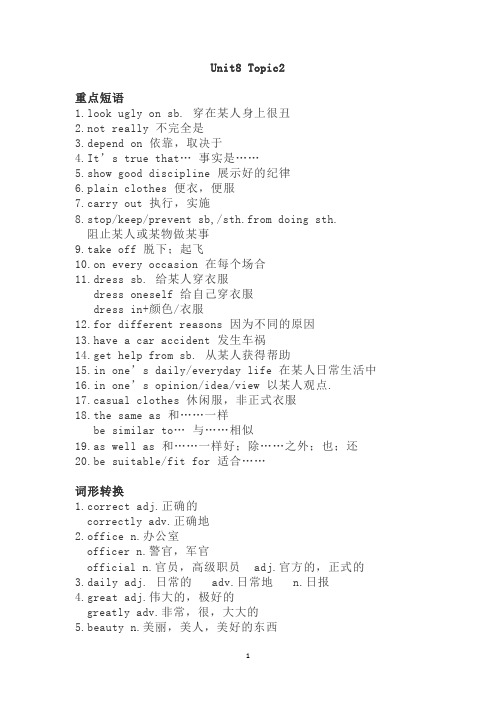
Unit8 Topic2重点短语1.look ugly on sb. 穿在某人身上很丑2.not really 不完全是3.depend on 依靠,取决于4.It’s true that…事实是……5.show good discipline 展示好的纪律6.plain clothes 便衣,便服7.carry out 执行,实施8.stop/keep/prevent sb,/sth.from doing sth.阻止某人或某物做某事9.take off 脱下;起飞10.on every occasion 在每个场合11.dress sb. 给某人穿衣服dress oneself 给自己穿衣服dress in+颜色/衣服12.for different reasons 因为不同的原因13.have a car accident 发生车祸14.get help from sb. 从某人获得帮助15.in one’s daily/everyday life 在某人日常生活中16.in one’s opinion/idea/view 以某人观点.17.casual clothes 休闲服,非正式衣服18.the same as 和……一样be similar to…与……相似19.as well as 和……一样好;除……之外;也;还20.be suitable/fit for 适合……词形转换1.correct adj.正确的correctly adv.正确地2.office n.办公室officer n.警官,军官official n.官员,高级职员 adj.官方的,正式的3.daily adj. 日常的 adv.日常地 n.日报4.great adj.伟大的,极好的greatly adv.非常,很,大大的5.beauty n.美丽,美人,美好的东西beautiful adj.美丽的,漂亮的beautifully adv.漂亮地,美好地6.dress v.穿衣n.连衣裙,女装dressing n.穿戴,穿衣重点句型1.It depends on who will design our clothes.这取决于谁设计我们的衣服。
初二下册英语语法大全

初二下册英语语法大全一.现在进行时:现在进行时的基本用法:1。
表示说话时正在进行的动作常和now 连用,有时用一个look、listen ,来表now 这一时间概念。
Eg:*Look! A train is coming .看,火车来了Listen! He is playing the piano.听,他在弹琴。
2。
表示现阶段正在进行的动作但不一定是说话时正在进行.常和at present ,this week ,these days…等时间状语连用。
*What lesson are you studying this week?你们本周学哪一课了?(说话时并不在学)3。
现在进行时有时可用来表示一个在最近按计划或安排要进行的动作.即是说可以用来代替将来时,但此时,一般要与表示将来时的时间状语连用,而且仅限于少量动词。
如:go,come, leave,start,arrive,return . sleep *Are you going to Tianjin tomorrow?你明天去天津吗?*How many of you are coming to the party next week? 你们有多少人下周要来参加晚会?二、一般将来时:.be going to+ 动词原形~对于将要发生的事,或打算、计划、决定要做的事情时,皆以be going to + 动词原形的句型来表示因此此句型有be动词,所以是否用am, is,are ,决定于主语1。
肯定句:主语+be (is,am, are) going to +动词原形◇I am going to play football next Sunday。
下周日我打算踢足球◇He is going to travel around the world。
他计划周游世界。
◇They are going to meet outside the school gate. 他们打算在校门口见面。
八年级下册英语10大语法汇总,超详细讲解

八年级下册英语10大语法汇总,超详细讲解一.询问某人的健康问题及遭到麻烦的表达方法1.询问某人患了何种疾病或遇到了何种麻烦时,常用以下几种结构来表达:What’s the matter (with sb.)?(某人)怎么了?What’s wrong (with sb.)?(某人)怎么了?What’s the trouble with sb? 某人出什么事了?What happened to sb? 某人发生了什么事?Are you OK? 你没事吧?Is there anything wrong with sb.?某人有不舒服/麻烦吗?2.要表达身体疼痛或不舒服,可用以下结构:①某人+have/has+病症The twins have colds.双胞胎感冒了。
②某人+have/has+a+headache/toothache/stomachache/backache/earache. She had a stomachache last night.她昨晚肚子痛。
③某人+have/has+a+sore+发病部位He has a sore throat.他喉咙痛。
④某人+hurt(s)+身体部位或反身代词He hurt his leg.他的腿受伤了。
⑤某部位+hurt(s).My head hurts badly.我头痛得厉害。
⑥某人+have/has+a pain+in one’s+身体部位I have a pain in my chest.我胸口痛。
⑦(There is) something wrong with one’s+身体部位There is something wrong with my right eye.我的右眼有毛病。
⑧其他表达方式She has a heart trouble.她有心脏病。
He got hit on the head.他头部受到了撞击。
She cut her finger.她割破手指了。
英语八下人教版重点语法

英语八下人教版重点语法
英语八下人教版的重点语法包括:
1.过去完成时(Past Perfect Tense):用来表示在过去某个时间或动作之前已经发生或完成的动作。
例如:I had already
finished my homework before my mom came back.
2.时间状语从句(Time clauses):用来表示时间关系的从句,一般以when,as soon as,until,before,after等引导。
例如:We will go to the park when it stops raining.
3.条件状语从句(Conditional clauses):用来表示假设条件的从句,一般以if引导。
例如:If it rains tomorrow, we will stay at home.
4.动词不定式(Infinitives):用来表示目的、原因、建议等。
例如:I went to the store to buy some groceries.
5.被动语态(Passive voice):用来强调动作的承受者而不是执行者。
例如:The cake was made by my mom.
6.定语从句(Relative clauses):用来修饰名词或代词的从句,一般由关系代词who,which,that引导。
例如:The boy who won
the competition is my neighbor.
这些语法结构在英语八下人教版教材中经常出现,需要学生掌握
和应用。
希望以上回答能对您有帮助。
(完整版)人教版英语八年级下册重点词组、句型及语法点汇总,推荐文档
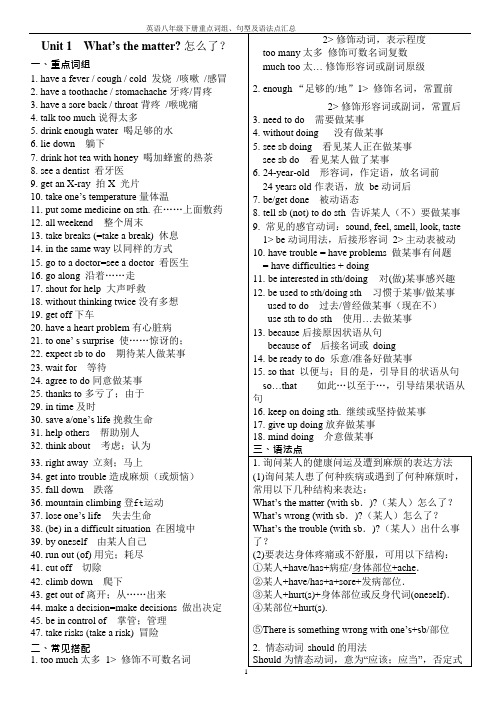
13.be back 回来14.be angry with sb 生某人的气15.throw down 扔下16.the minute=as soon as 一…就…e over 过来18.sit down 坐下19.take sb. for a walk 带某人去散步20.all the time 频繁;反复21.all day / evening 整日/夜22.shout back 大声回应23.walk away 走开24.in surprise 惊讶地25.share the housework 分担家务26.hang out 闲逛27.do chores 做杂务28.go to the store 去商店29.buy drinks and snacks 买饮料和点心30.make sb. do sth. 使某人做某事31.have enough stress from 有来自…足够的压力32.a waste of time 浪费时间33.in order to 为了34.get good grades 取得好成绩35.depend on 依赖;依靠36.have no idea 不知道37.develop children’s independence 发展孩子独立性38.look after=take care of 照顾;照看39.as a result 结果40.agree with sb 同意某人的观点/意见disagree with sb 不同意某人的观点/意见二、常见搭配1.finish doing sth. 完成做某事2.a few “几个”,后接可数名词复数few “很少,几乎没有”,后接可数名词复数a little “一点儿”,后接不可数名词little “很少,几乎没有”,后接不可数名词3.1> question “问题”,需要回答的问题,与ask或answer 搭配2> problem “问题”,需要解决的问题,与solve 搭配in the front of “在…前面”,在所说范围之内5.as…as… “与…一样…”,中间加形容词或副词原级,。
八年级下册英语重点短语及句型总汇

八年级下册英语重点短语及句型总汇Summary of Common Infinitive Phrases and Sentence Patterns in Grade 8 EnglishInfinitive phrases with "to" are commonly used in English。
Here are some common ns:hope to do sth。
- to want to do somethingdecide to do sth。
- to make a n to do somethingagree to do sth。
- to consent to do somethingneed to do sth。
- to require someone to do somethinguse sth to do sth - to utilize something to do something else can't wait to do - to be impatient to do somethingget/be ready to do - to prepare oneself to do somethingtry to do sth - to make an effort to do somethingplan to do sth。
- to intend to do somethinghave to do - to be obliged to do somethingtake one's turn to do sth。
- to alternate in doing something refuse to do sth。
- to decline to do somethingtell sb。
to do sth。
- to instruct XXX do somethingask sb。
八年级下册英语知识点最全归纳

八年级下册英语知识点最全归纳Unit 1 短语及句型1.many\\much---- more + 可数或不可数名词更多few --- fewer + 可数名词更多little ----- less +不可数名词更少例如:more people、more pollution、less free time、less pollution、fewer cars、fewer trees2.there will be 将会有 There will be more people.将会有更多的人Will there be less pollution?会有更少的污染吗?Yes,there will.\\ No,there won’t.是,会有。
\\ 不,不会有。
3.be free 免费的4. on computers 在电脑上 on paper 在纸上5.live to be 活到 live to be 200 years old 活到200岁6.fall in love with sb.\\sth. 喜爱某人或某物7.live alone 单独居住8.on vacation 度假9.over and over again 一遍又一遍10.be the same as 与…一样be different from 与…不同unit 2 单词及短语1.What should I \\he\\she\\they\\you do? 我\\他\\她\\他们\\你该怎么办? You could write him a letter. 你可以给他写一封信。
2.argued with sb. 与某人争吵3.out of style 过时的 in style 时尚的4.a ticket to a ball game 一场球赛的票5.surprise sb. 使某人惊奇be surprised at sth. 对…感到惊奇to one’s surprise 令某人惊奇的事6.pay for 支付7.ask sb. for sth. 向某人要求某物ask sb. to do sth. 要求某人做某事8.have a bake sale 烧烤9.find out 发现,查明10.get on well with sb. 与某人相处得好11.have a fight with sb. 与某人争吵、打架12.not……until 直到…才13.it’s time for sth.\\it’s time to do sth. 做某事的时间到了14.under too much pressure 承受太多的压力15.take part in 参加,参与16.a mother of three 三个孩子的妈妈Unit 3 短语及句型1.What were you doing when the UFO arrived?当UFO到达时你在干什么?2.While the boy was walking down the street, the UFO landed. 当男孩在沿着街道走时,UFO降落了3.in front of 在…之前(外部整体前)in the front of (内部整体前)4.talk on the phone 在电话中交谈nd on the street 在街上降落6.walk down the street 沿着街道走7.take off (过去式 took off) 起飞8.around ten o’clock 大约10点9.You can imagine how strange it was!你可以想象它有多奇怪!10.Museum of Flight 飞行博物馆11.jump down 跳下来12.in a tree 在树上 on a tree 长在树上13.run away 跑开,逃跑14.say to sb. 对某人说15.one of the most important events 最重要的事件之一 (one of + 形容词最高级+名词复数)最…之一16.in silence 无声的17.take place 发生(预先安排) happen 发生 (偶然)18.have meaning to sb. 对…来说有意义Unit 4 短语及句型1.He said he was hard-working. 他说他努力学习了2.She said she was having a party for Lana她说她为Lana举行了聚会3.mad at sb. 对某人生气4.first of all 首先5.pass sth. to sb. \\ pass on sth. 传递某物6.be sppoused to 应该7.I’m better at reading than listening. 我的阅读比听力好。
八下英语_Module 6 简单句的基本句型
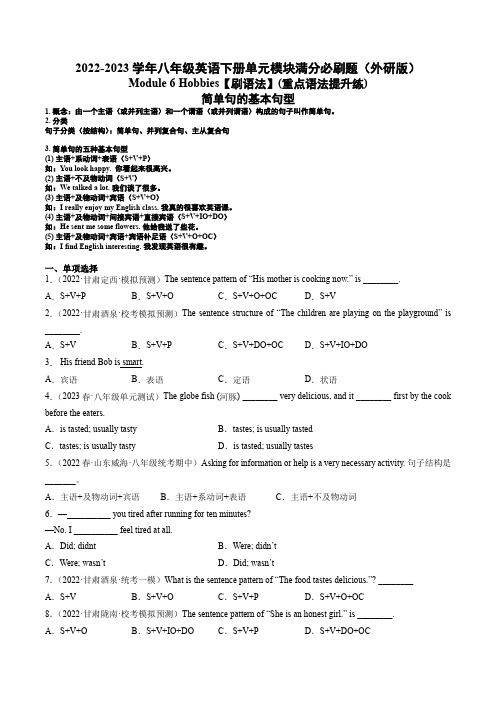
2022-2023学年八年级英语下册单元模块满分必刷题(外研版)Module 6 Hobbies【刷语法】(重点语法提升练)简单句的基本句型1. 概念:由一个主语(或并列主语)和一个谓语(或并列谓语)构成的句子叫作简单句。
2. 分类句子分类(按结构):简单句、并列复合句、主从复合句3. 简单句的五种基本句型(1) 主语+系动词+表语(S+V+P)如:You look happy. 你看起来很高兴。
(2) 主语+不及物动词(S+V)如:We talked a lot. 我们谈了很多。
(3) 主语+及物动词+宾语(S+V+O)如:I really enjoy my English class. 我真的很喜欢英语课。
(4) 主语+及物动词+间接宾语+直接宾语(S+V+IO+DO)如:He sent me some flowers. 他给我送了些花。
(5) 主语+及物动词+宾语+宾语补足语(S+V+O+OC)如:I find English interesting. 我发现英语很有趣。
一、单项选择1.(2022·甘肃定西·模拟预测)The sentence pattern of “His mother is cooking now.” is ________.A.S+V+P B.S+V+O C.S+V+O+OC D.S+V2.(2022·甘肃酒泉·校考模拟预测)The sentence structure of “The children are playing on the playground” is ________.A.S+V B.S+V+P C.S+V+DO+OC D.S+V+IO+DO3. His friend Bob is smart.A.宾语B.表语C.定语D.状语4.(2023春·八年级单元测试)The globe fish (河豚) ________ very delicious, and it ________ first by the cook before the eaters.A.is tasted; usually tasty B.tastes; is usually tastedC.tastes; is usually tasty D.is tasted; usually tastes5.(2022春·山东威海·八年级统考期中)Asking for information or help is a very necessary activity. 句子结构是_______。
八年级英语下册Unit1What's the matter?短语和重要句型(210个)汉英対译版

Unit1 What’s the matter?1.谈论健康问题与事故talk about health problems and accidents2.提出建议give advice3.后背疼have a sore back4.肚子/胃疼have a stomachache5.得/患感冒have a cold6.话说太多talked too much7.水没喝够didn’t drink enough water8.嗓子非常疼has a very sore throat9.发烧fever/have a fever10.给你量体温take your temperature11躺下休息lie down and rest12咳嗽并且嗓子疼cough and sore throat13.喝加蜂蜜的热茶drink some hot tea with honey14.牙疼have a toothache15.看牙医并且拍个x光片see a dentist and get an X-ray16.把我自己割伤了cut myself17.在伤口处上点药put some medicine on it18.我的头非常热my head feels very hot19.可能你发烧了maybe you have a fever20.Lisa, 你好吗?Lisa, are you OK?21我脖子动不了了I can’t move my neck22我该怎么办啊?What should I do?23量体温take my temperature24听起来你不像发烧It doesn’t sound like you have a fever25整个周末all weekend26需要休息远离电脑need to take breaks away from the computer 27在周末on the weekend28打电脑游戏play computer games29可能那就是原因。
Unit8全面知识点总结(词汇、短语、句型、语法、习作) 2020-2021学年人教版八年级英语下册

Unit8知识点全面总结(词汇到作文)2020-2021学年人教版八年级英语下册(词汇、短语、句型、语法、习作)一.课本词汇和用法1.full of 满是...的,大量...be full of 意为“充满/装满……”。
Oliver Twist is about a boy who goes2.out to sea(1)and finds an island full of treasures.Be full of 表示状态,意为“充满...的”full是形容词。
该(2)短语相(3)当于be filled with,意为“以...填充”,是一个被动语态,fill是动词。
例如:I always believe the world is full of love.= I always believe the world is filled with love. 我总是相信世界充满了爱。
full还有“饱的。
饱满的”,其反义词为hungry 饥饿的3.treasure [ˈtreʒər] n. 财富(不可数名词);珠宝,珍藏品(可数名词)例如:They went there to look for treasure. 他们去那里寻宝。
That island is full of treasures. 那座岛上都是珠宝。
4.Island [ˈaɪlənd] n. 岛,岛屿An island 一座岛5.Classic [ˈklæsɪk] n. 经典作品;名著(可数名词)Classical adj. 经典的;古典的;传统的例如:I like classical music. 我喜欢古典音乐。
6.page [peɪdʒ] n. (书刊或纸张的)页,面,张表示多少页用“数字+page(s)”表示在第几页时用“on page +数字”(无论数字是多少,page 都用单数)例如:100 pages 100页On page 56 在第56页7.hurry [ˈhɜːri] v. 匆忙,赶快hurry up 赶快,急忙Come on!或Be quick!hurry to + 地点名词,意为“匆忙去某地”。
八年级下册英语单词词组句型
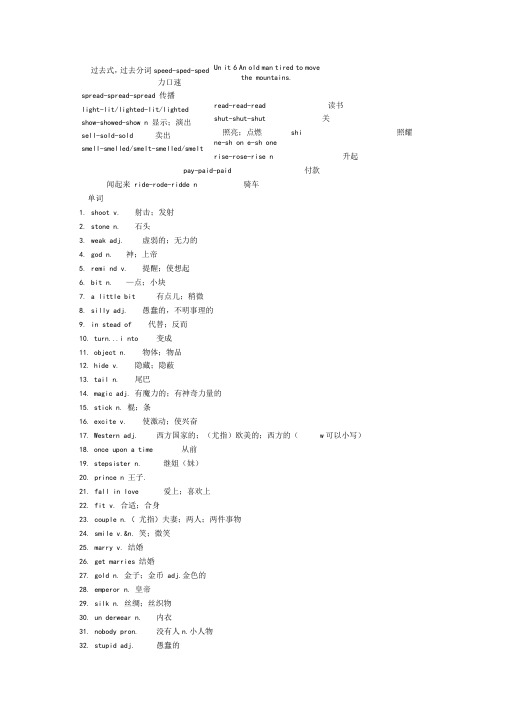
过去式,过去分词 speed-sped-sped力口速spread-spread-spread 传播 light-lit/lighted-lit/lighted show-showed-show n 显示;演出 sell-sold-sold卖出smell-smelled/smelt-smelled/smelt照耀w 可以小写)Un it 6 An old man tired to move the mountains.read-read-read 读书 shut-shut-shut关照亮;点燃shine-sh on e-sh one rise-rose-rise n升起pay-paid-paid付款闻起来 ride-rode-ridde n 骑车单词1. shoot v. 射击;发射2. stone n. 石头3. weak adj. 虚弱的;无力的4. god n.神;上帝5. remi nd v. 提醒;使想起6. bit n.—点;小块7. a little bit 有点儿;稍微 8. silly adj. 愚蠢的,不明事理的 9. in stead of 代替;反而 10. turn...i nto 变成 11. object n. 物体;物品 12. hide v. 隐藏;隐蔽 13. tail n.尾巴14. magic adj. 有魔力的;有神奇力量的 15. stick n. 棍;条 16. excite v. 使激动;使兴奋17. Western adj.西方国家的;(尤指)欧美的;西方的(18. once upon a time 从前 19. stepsister n. 继姐(妹)20. prince n 王子. 21. fall in love爱上;喜欢上22. fit v. 合适;合身23. couple n.( 尤指)夫妻;两人;两件事物 24. smile v.&n. 笑;微笑 25. marry v. 结婚 26. get marries 结婚27. gold n. 金子;金币 adj.金色的 28. emperor n. 皇帝 29. silk n. 丝绸;丝织物 30. un derwear n. 内衣31. nobody pron. 没有人n.小人物 32. stupid adj.愚蠢的33.cheat v. 欺骗;蒙骗n.骗子34.stepmother n. 继母35.wife n. 妻子;太太27. keep sth for oneself把……留作自己使用28. a fairy tale 神话故事 29. for the first time 第一次30. make changes 变化 31. come out 出来,出版,开花36. husband n. 丈夫37. whole adj.全部的;整体的38. scene n.(戏剧或歌剧的)场; 场景 39. moonlight n月光40. shine v.发光;照耀41. bright adv.光亮的;明亮的 adj. 明亮的;光线充足的 42. ground n.地;地面43. lead v.带路;领路44. voice n. 声音45. brave adj. 勇敢的;无畏的、词组1. It is saidthat... 据说2. give a talk作报告 3. tell the truth 说真话4. continue to do , continue doing继续做使某人记起某事 提醒某人去做 5. remind sb of sth6. remind sb to do sth7. get lost 迷路8. turn into 变成9. once upon a time10. neither...nor...曾经,很久以前既不... 也不 ... 11. instead of 反而;代替12. hide sth from sb 藏起来不让人发现;躲避某人;隐藏 13. as soon as一 ... 就... 14. fall in love with sb be in love with爱上某人 15. be fit for 适应;适合be fit to do 16. use sth to do 用 ... 做某事 17. make a plan to do sth 制作计划做某事18. lead sb to 引向 lead to 导致 19. get maried = marry结婚 20. marry sb= get married to sb 嫁给某人, 娶了某人 21. be married to sb get married to sb22. work on 从事 和某人结婚 23. day after day24. year after year 25. can ' t/couldn26. find the way out天又一天 一年又一年 t stop doing sth 忍不住做什么找到出路,找到解决问题的方法unit7 What四、句子does the story begin这个故事是如何开始的Once upon a time, there was a very old man … 很久以前,有一位老翁 ...1. What happe ned next接下来会发生什么事As soon as the manfinishedtalking, Yu Gong said that his family could continueto move the mou nta ins after he died. 一人说完后。
八年级下英语基本句型及语法

八年级下英语基本句型及语法1.Kids will study at home on computers.表通过电脑、电视及广播等用介词on2.In ten years, I think I will be a reporter.In , after和later的区别in +时间段:与将来时连用He will be back in two hours.after +时间段:与过去时连用He came back after two hours.after +时间点:可与将来时连用He will be back after two o\'clock.later只能接在时间段之后,即可用于过去时也可用于将来时。
Some days later, he become well again.I will go back two days later.3. On the weekend, I will be able to dress more cusually.can , be able to.1)can表示“能力”时,和be able to相当,许多场合都可以互相替换。
但当叙述过去经过一番努力才能完成的事情或前面有特殊说明,表示你有能力时,只能用be able to。
Can you speak any foreign languages?=Are you able to speak any foreign languages?2).can 只能用于一般现在时和一般过去时,而be able to可用于各种时态。
No one could / was able to answer this question.When he grows up, he will be able to support his family.他长大后就能养家了。
Frank is ill. He hasn't been able to go to school for one week. 弗兰克病了,已经一周没去上学了。
八年级英语下册Unit9短语句型话题作文
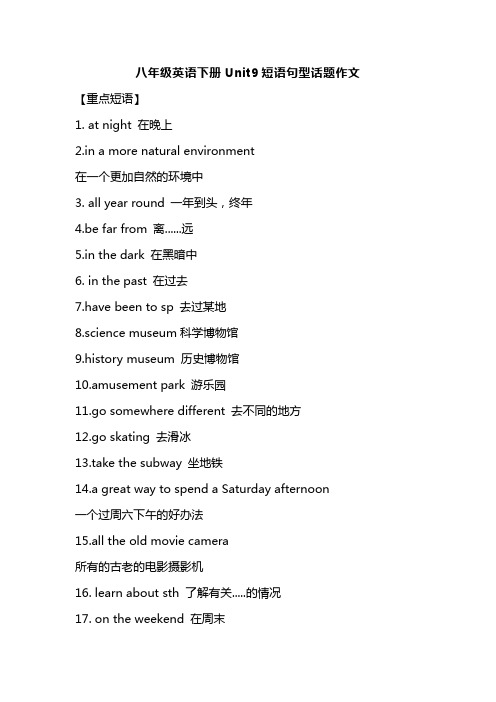
八年级英语下册Unit9短语句型话题作文【重点短语】1. at night 在晚上2.in a more natural environment在一个更加自然的环境中3. all year round 一年到头,终年4.be far from 离......远5.in the dark 在黑暗中6. in the past 在过去7.have been to sp 去过某地8.science museum科学博物馆9.history museum 历史博物馆10.amusement park 游乐园11.go somewhere different 去不同的地方12.go skating 去滑冰13.take the subway 坐地铁14.a great way to spend a Saturday afternoon一个过周六下午的好办法15.all the old movie camera所有的古老的电影摄影机16. learn about sth 了解有关.....的情况17. on the weekend 在周末18.camp in the mountains 在大山里露营19.put up a tent 搭帐篷20.in such a rapid way 以如此速猛的方式21.different kinas of 各种各样的22.development of toilets 厕所的发展23.social groups 社会团体24.the tea art performances 茶艺表演25. make a perfect cup of tea with beautiful tea sets. 用漂亮的茶具沏一杯完美的茶26. a nice place to enjoy tea 一个品茶的好地方27.Thousands of 数以千计的28.international Museum of Toilets 国际厕所博物馆29.the Terracotta Army 兵马俑30.southeast Asia 东南亚31.night Safari 夜间动物园32.three quarters 四分之三33. an English-speaking country一个讲英语的国家34.have a problem doing sth 做某事很困难35.during the daytime 在白天36. a couple of times 好几次37.right now 现在,目前38. an amusement park with a special theme一个有特别的主题的游乐园39. Walk around the park 在公园里到处走40. hear of 听说41. take a ride 兜风42. another province 另一个省43. the Bird’s Nest 鸟巢44. encourage sb to do sth 鼓励某人做某事45. on the one hand....on the other hand 一方面,另一方面【重点句型】1. Have you ever been to a science museum?你曾经去过科学博物馆吗?2.Let\'s go somewhere different today.让我们今天去不同的地方吧。
仁爱英语八年级下册重点短语句型

仁爱英语八年级下册重点短语句型总结Unit5 Topic1短语1. a ticket to 。
.一张票2. cheer up (使)振作起来;(使)高兴起来3。
carefor 照顾,照料 4. in the end 最后,终于5。
because of 由于,因为6。
prepare。
. for.。
为.。
.。
做准备7。
be able to能8. agree with同意9。
make peace with 与。
.。
讲和;与。
...言归于好句型1. My father and mother want to invite your parents to go to the movies. (invite sb. to do sth。
)2。
He seems a little unhappy. (seem + adj。
)3. Beijing Opera is full of famous stories..。
(be full of。
)Unit 5 Topic 2短语1. be strict with..对.。
.严格要求2。
takeiteasy 别紧张,别着急3. by theway顺便提一下;捎带说一声4。
as usual像往常一样5。
deal with处理,解决;对付6。
even though即使,尽管7. not..any longer不再8。
be worried about对。
..。
感到担心句型1. What seems to be the problem? (seem to do。
..)2. I'm feeling really sad because I failed the English exam。
(because原因状语从句)3. I find it difficult to learn English well。
(find it adj. to d.。
)4。
| 'm getting used to the life here. (be/ get used to(doing) sth. 。
人教版英语八年级下册Unit2单元短语句型归纳
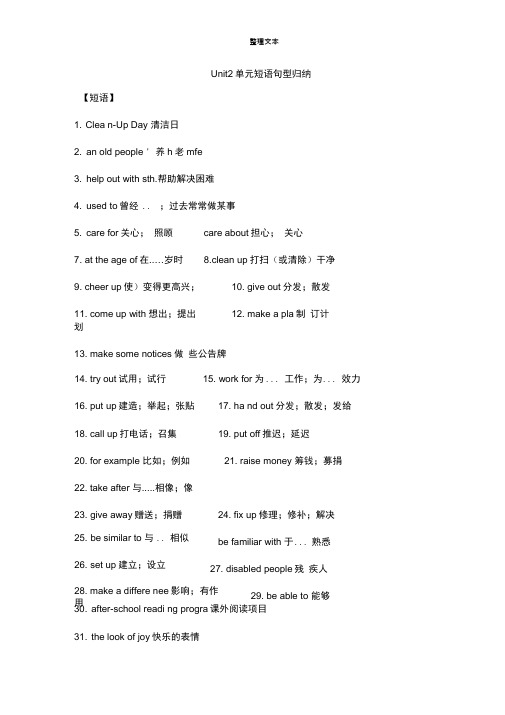
整理文本Unit2单元短语句型归纳【短语】1. Clea n-Up Day 清洁日2. an old people ' 养h 老mfe3. help out with sth.帮助解决困难4. used to 曾经 .. ;过去常常做某事5. care for 关心; 照顾care about 担心; 关心 7. at the age of 在..…岁时 8.clean up 打扫(或清除)干净9. cheer up 使)变得更高兴; 10. give out 分发;散发11. come up with 想出;提出12. make a pla 制 订计划13. make some notices 做 些公告牌30. after-school readi ng progra 课外阅读项目31. the look of joy 快乐的表情14. try out 试用;试行 16. put up 建造;举起;张贴18. call up 打电话;召集20. for example 比如;例如22. take after 与.....相像;像23. give away 赠送;捐赠 25. be similar to 与.. 相似 26. set up 建立;设立28. make a differe nee 影响;有作用 15. work for 为 ... 工作;为 ... 效力 17. ha nd out 分发;散发;发给 19. put off 推迟;延迟 21. raise money 筹钱;募捐 24. fix up 修理;修补;解决 be familiar with 于 ... 熟悉 27. disabled people 残 疾人 29. be able to 能够【典句必背】整理文本1. The boy could give out food at the food bank这个男孩可以在食品救济站分发食物。
八下英语简单句的五种基本句式
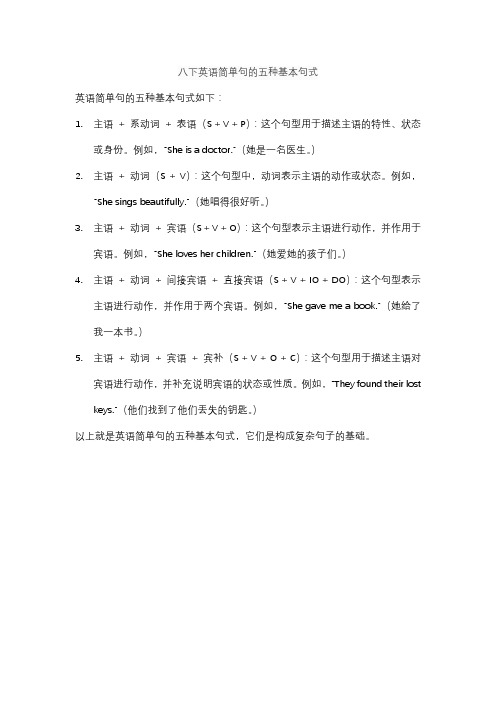
八下英语简单句的五种基本句式
英语简单句的五种基本句式如下:
1.主语+ 系动词+ 表语(S + V + P):这个句型用于描述主语的特性、状态
或身份。
例如,“She is a doctor.”(她是一名医生。
)
2.主语+ 动词(S + V):这个句型中,动词表示主语的动作或状态。
例如,
“She sings beautifully.”(她唱得很好听。
)
3.主语+ 动词+ 宾语(S + V + O):这个句型表示主语进行动作,并作用于
宾语。
例如,“She loves her children.”(她爱她的孩子们。
)
4.主语+ 动词+ 间接宾语+ 直接宾语(S + V + IO + DO):这个句型表示
主语进行动作,并作用于两个宾语。
例如,“She gave me a book.”(她给了我一本书。
)
5.主语+ 动词+ 宾语+ 宾补(S + V + O + C):这个句型用于描述主语对
宾语进行动作,并补充说明宾语的状态或性质。
例如,“They found their lost keys.”(他们找到了他们丢失的钥匙。
)
以上就是英语简单句的五种基本句式,它们是构成复杂句子的基础。
- 1、下载文档前请自行甄别文档内容的完整性,平台不提供额外的编辑、内容补充、找答案等附加服务。
- 2、"仅部分预览"的文档,不可在线预览部分如存在完整性等问题,可反馈申请退款(可完整预览的文档不适用该条件!)。
- 3、如文档侵犯您的权益,请联系客服反馈,我们会尽快为您处理(人工客服工作时间:9:00-18:30)。
人教八下重要短语、句型及语法Unit 1 What’s the matter?一、重点短语1. have a fever 发烧2. have a cough 咳嗽3. have a toothache 牙疼4. talk too much 说得太多5. drink enough water 喝足够的水6. have a cold 受凉;感冒7. have a stomachache 胃疼8. have a sore back 背疼9. have a sore throat 喉咙痛 10. lie down and rest 躺下来休息 11. so that 以便 12. see a dentist 看牙医 13. get an X-ray 拍X 光片 14. take one’s temperature 量体温 15. give up 放弃 16. keep on doing sth. 坚持做某事 17. sound like 听起来像 18. run out (of) 用完; 用尽 19. in the same way 以同样的方式 20. be used to doing sth. 习惯做某事 21. go along 沿着……走 23. make a decision 做出决定 24. without thinking twice 没有多想 25. get off 下车 26. have a heart problem 有心脏病 27. to one’s surprise 使....... 惊京讶的 28. thanks to 多亏了;由于 29. in time 及时 30. save a life 挽救生命 31. get into trouble 造成麻烦 32. right away 立刻;马上 33. because of 由于 34. get out of 离开;从……出萍 35. hurt oneself 受伤 36. take risks 冒险 37. fall down 摔倒 38. feel sick 感到恶心/感到不舒服 39. have a nosebleed 流鼻血 40. so. . . that 如此……以至于… 41. have problems breathing 呼吸困难 42. be in control of 掌管;管理二、重点句型1. What’ s the matter with you? / What’ s wrong with you? 你怎么了?2. What should she do? 她该怎么办呢?→主语+ should/shouldn’t + 动词原形. .. ①You should lie down and rest. 你应该躺下休息一会儿。
② You shouldn’t go out at night. 你晚上不应该出去。
3. Do you think it comes from a newspaper or a book? 你认为它是来自报纸还是书呢?4. I think I sat in the same way for too long without moving. 我想我以同样的姿势一动不动地坐得太久了。
5. She said that the man had a heart problem and should go to the hospital 三、重点语法1. have在涉及健康问题的句子中的应用。
2. 情态动词should和shouldn’t表“建议”、“提议”或“请求”等。
3. 反身代词。
4. see sb. doing sth.表示“看到某人正在从事某事或正处于某种状态”see sb. do sth (注:不定式不必带 to)表示“看见某人/某物做完某事” 5. thanks to sb./sth.表示“多亏;因为;由于”Unit 2 I ’ll help to clean up the city parks.一、重点短语1. Clean-Up Day 清洁日2. an old people’s home 养老院3. help out with sth. 帮助解决困难4. used to 曾经……;过去5. care for 关心;照顾6. the look of joy 快乐的表情7. at the age of 在......岁时8. clean up 打扫(或清除)干净9. cheer up (使)变得更高兴;振雀 10. give out 分发; 散发 11. come up with 想出;提出 12. make a plan 制订计划 13. make some notices 做些公告牌 14. try out 试用;试行 15. work for 为…工作;为…. 效力 16. put up 建造;举起;张贴 17. hand out 分发;散发;发给 18. call up 打电话;召集 19. put off 推迟;延迟 20. for example 比如;例如 21. raise money 筹钱;募捐 22. take after 与......相像;像 23. give away 赠送;捐赠 24. fix up 修理;修补;解决 25. be similar to 与……相似 26. set up 建立;设立 27. disabled people 残疾人 28. make a difference 影响;有作用 29. be able to 能够 30. after-school reading program课外阅读项目二、重点句型1. The boy could give out food at the food bank. 这个男孩可以在食品救济站分发食物。
2. Clean-Up Day is only two weeks from now. 清洁日离现在仅仅两周的时间。
3. He volunteers at an animal hospital every Saturday morning. 每周六上午,他都在一'家动物医院当志愿者。
4. Last year, she decided to try out for a volunteer after-school reading program. 去年,她决定去参加一个课外阅读项目的志愿者的选拔。
5. I want to put off my plan to work in an animal hospital until next summer. 我想把我在动物医院工作的计划推迟到明年夏天。
7. Most people today are only worried about getting good jobs to make lots of money. 现在的大部分人只是为找一份能挣许多钱的好工作而着急。
8. You helped to make it possible for me to have Lucky. 在你的帮助下,我才有可能拥有“幸运儿”。
三、重点语法1. 动词不定式作宾语;状语和宾语补足语。
2. 情态动词could表建议的用法。
3. 动词短语。
Unit 3 Could you please clean your room?一、重点短语1. go out for dinner 出去吃饭2. stay out late 在外面待到很晚3. go to the movies 去看电影4. get a ride 搭车5. work on 从事6. finish doing sth. 完成做某事7. depend on依赖;依靠8. do the dishes 洗餐具9. take out the rubbish 倒垃圾 10. fold your/the clothes 叠衣服 11. sweep the floor 扫地 12. make your/the bed 整理床铺 14. no problem 没问题 15. welcome sb. 欢迎某人 16. come home from work下班回家 17. throw down 扔下 18. a waste of time浪费时间 19. make sb. do sth. 使某人做某事 20. take sb. for a walk 带某人去散步 21. all the time 一直;总是 22. all day/evening 整曰/夜 23. do house work 做家务 24. shout back 大声回应 25. enough stress足够的压力 26. share the housework 分担家务 27. look after/take care of 照顾;照看 28. in surprise 惊讶地 29. get something to drink 拿点喝的东西 30. in order to为了 31. hang out 闲逛 32. do one’s part in (doing ) sth. 做某人分内的事 33. lend sb. sth. 把某物借给某人 34. get good grades取得好成绩 35. hate to do sth. 讨厌做某事 36. do chores 做杂务 37. help sb. do / with sth 帮助某人干某事 38. mind doing sth. 介意做某事 39. buy some snacks买些小吃 40. go to the store去商店 41. invite sb. to a party邀请某人参加聚会二、重点句型1. Could you please…..do sth. ? / Could you please clean your room?2. I have to do some work. 我必须干些活。
3. Could I+ do sth. ? → Could I use your computer?4. She won’ t be happy if she sees this mes s.如果她看到这样乱七八糟的话,她会不高兴的。
5. For one week, she did not do any housework and neither did I. 整整一周,她什么家务活都不干了,我也一样。
6. My mom came over as soon as I sat down in front of the TV . 我一在电视机前坐下,我妈妈就过来了。
